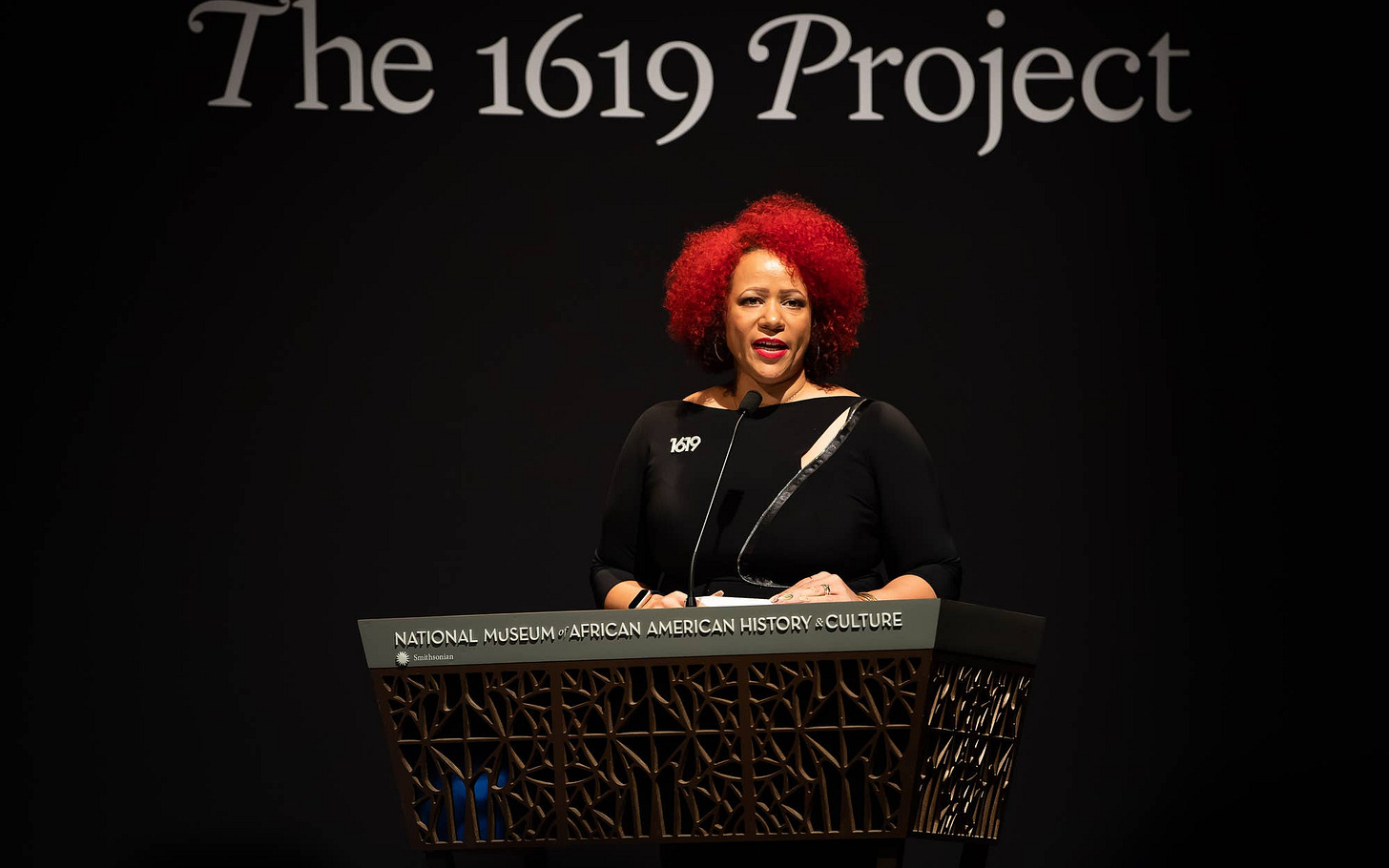Nikole Hannah-Jones' Tenure Denial Underscores Limits to her Assimilationist Philosophy
Black people are more than this nation that still won’t accept them
Pulitzer Prize-winning journalist Nikole Hannah-Jones has been rejected for tenure by the University of North Carolina despite an incredible resume
Nikole Hannah-Jones has done just about everything someone in her position is supposed to. She’s kept her discourse within the allowable bounds and thus risen to the heights of journalistic popularity and esteem as a staff writer at the New York Times.
She’s written about race and class, but mostly in historical terms and even when she connects systemic oppression to modern days, she still stands behind the stewards of the system come election time. Hannah-Jones has done what she was supposed to, what she’s allowed to, by the standards of respectable journalism and has earned commensurate reward.
Even at her relatively young age, Hannah-Jones has already accumulated just about every position and honor that the establishment values in her profession. She’s earned over half a million followers on Twitter and a byline at the New York Times.
She earned a lucrative MacAurthur Foundation “Genius” grant as well as a Pulitzer Prize for her journalism on the 1619 Project that she founded. It simply doesn’t get better credentialed than Nikole Hannah-Jones when it comes to corporate/establishment journalism standards.
Yet, that still isn’t good enough for the University of North Carolina, who decided to not offer her a tenured professorship in its journalism school after pressure from White Supremacist activists who object to her 1619 Project work.
It is good and important that the 1619 Project was produced and published at an institution as racist and colluding with American Empire as The Times. Hannah-Jones’ opening essay for the project is likely quite useful for readers who didn’t previously know that our nation’s so-called Founding Fathers were racist, that slavery was bad, and that indeed from its origination the United States has always been a fundamentally racist state.


Her essay highlights systemic historical crimes against Black people as well as their inestimable contribution to the nation. Her essay accurately points out that America is a racist nation, always has been, and that many of the moments and decisions we have enshrined as leaps forward towards racial equality were themselves, in fact, motivated by the cynical racism of our leaders.
Her essay accurately summarizes that our very own war for independence, declared in 1776, was fought in large part to keep chattel slavery going here in the United States. If Hannah-Jones would have actually cited the scholarship from the likes of historian Gerald Horne who culled through the archive to demonstrate this, she might have inoculated her essay from the subsequent attacks of liberal and conservative scholars alike who would later defensively dispute this fact.
Her essay asserts that American Exceptionalism is racism, and has always been threatened by the existence of free Black people. Though she relies on uncited radical scholarship to say truisms that may have never before been so comprehensively listed on the pages of The New York Times, Hannah-Jones’ essay ultimately settles on sentimental framing compatible with empire and thus acceptable to respectable corporate outlets like her own.
At the end of it all, Hannah-Jones transposes the genocidal value of American Exceptionalism instead of rejecting it. Her entire essay, filled with “radical” facts and notions like the United States is a racist country still ultimately presupposes that we currently have democracy, that the U.S. empire is something that deserves to exist, and that those who had the largest part in building this empire should be proud of it.
Her essay is book-ended by what could have been an interesting critical examination of how a nation-state’s most oppressed people are sometimes most effectively brainwashed by its deceitful rhetoric, perpetually sacrificing more and more of themselves to demonstrate their desire to be included instead of seeking true liberation. Instead, her essay ultimately accepts America and describes with uncritical patriotic mawkishness what amounts to a Stockholm Syndrome.
“We were told once, by virtue of our bondage, that we could never be American. But it was by virtue of our bondage that we became the most American of all,” the essay ends.
In the end the true freedom and liberation was, it may feel after reading her essay, realizing just how much Black folk helped America become the global hegemony that it is today. That seems like the ultimate success of oppressive ideology more than a feel-good and tidy ending to an essay about Black subjugation.
Hannah-Jones’ essay has the audacity to tell wealthy White readers that the United States is a racist country by summarizing history that many of them have not had to confront. This is why White Supremacist activists have waged an all-out attack on her.

Her essay also has the get-along common sense to - after speaking those inconvenient truths - end on a note of Black acceptance of and affection for U.S. empire. America is a genocidal country but and at least we were essential in building it!
In her essay’s world, an oft-ignored grisly past gets highlighted but is also kept squarely in the past as the U.S. has made its way to a present asserted as more democratic, though not supported by evidence but certainly bolstered by the absence of mentions of how we still don’t vote for President, Black people have no voter protection in Southern States and are systematically culled from voter rolls and not allowed on roads to travel to vote on voting day…or how we have concentration camps, torture and assassinate citizens, kill millions of Brown people abroad, have our every movement and conversation spied on by the government, and have a widening wealth gap, especially between Black and White.
It is little wonder, then, that Hannah-Jones’ essay is as applauded by liberals as it is wrongfully attacked by reactionaries. She condemns our nation’s history enough to make liberals feel like they’re exorcising demons, but concludes with the happy idea that Black folk might be content with simply being recognized as having helped build this nation that the rest of the world trembles in fear over.
We were bad, but Black folk helped us be better. Please recognize that contribution.
Hannah-Jones was applauded for the project and essay by liberals and intellectuals. She was lauded with awards and remuneration.
Still, she isn’t allowed the same authority as an educator and job security that her colleagues, most of whom could only dream of having her resume at such a young age have. Nikole Hannah-Jones has done everything right, everything the U.S. Empire’s propaganda arms of higher education and corporate media asked of her.
At the end of the day, however, these same institutions value White Supremacist activists more than they do her accomplishments, resume, and fealty. Hannah-Jones has just about every title, award, and signifier that an American intellectual can achieve, save for one.
She’s good enough to be a writer at the nation’s most respected newspaper, good enough to be called a “genius” and given half a million dollars by capitalist foundations created by bankers, and good enough to be given journalism’s highest award, named after a smut-pedaling oligarch. The establishment apparently draws the line at Hannah-Jones being called a full Professor by a super-majority White student population at a hallowed Southern institution.
Hannah-Jones’ assimilationist 1619 essay triumphantly declares at its closing that, though as a child she had thought that this nation wasn’t hers because Black people supposedly didn’t contribute to it, she now realizes just how much they have contributed to it and so knows that this is her country. As a child in school a teacher callously told students, including the lone Black pair Hannah-Jones and a classmate, to go to a globe and point out their country of origin.
“I walked over to the globe near my teacher’s desk, picked a random African country and claimed it as my own. I wish, now, that I could go back to the younger me and tell her that her people’s ancestry started here, on these lands, and to boldly, proudly, draw the stars and those stripes of the American flag.”
Of course Black people built the United States of America, and made it better than it would have been otherwise. It’s awful that we are taught anything other than that.
It is not true, however, that just because Black people built this nation, that they are now allowed into it as full, real citizens. Wishing does not make it so.
Work does not make it so. Loving and identifying with this monstrous empire’s flag does not make it so.
Pretending, tragically as she does in the closing lines of her essay, that “her people’s ancestry started here, on these lands,” does not make it so. Their story does, in fact, go much further back than at enslavement where Hannah-Jones’ essay begins the story.
Black people could not have possibly contributed more to America than they have and the United States could not possibly make it any more clear that right now, in 2021, it still rejects them wholesale. Nikole Hannah-Jones could not have done anything more to show she belongs, could not possibly be any more qualified to hold a position of full Professor at any university in this nation, and now this country is making it crystal clear that she’s still not worthy.
Hannah-Jones is wrong - Black people’s ancestry does not begin here in this colonized land of White supremacy. Black people are more than this nation that still won’t accept them.
Progressive intellectuals, especially those of color, need to realize that we are more than the acceptance of institutions that will always only give us conditional access.




Pretty sure she’s a woke clown